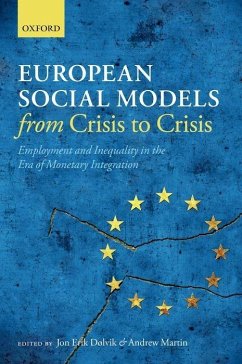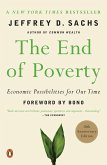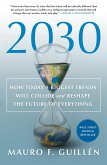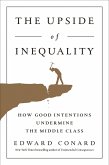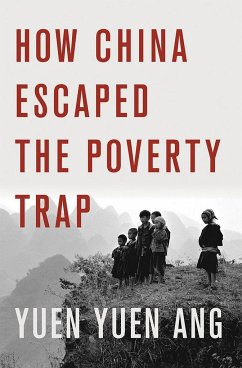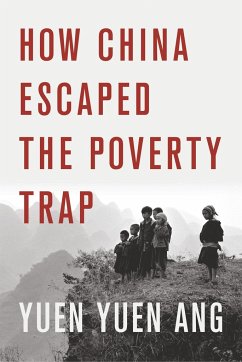European Social Models from Crisis to Crisis:: Employment and Inequality in the Era of Monetary Integration
Herausgeber: Dolvik, Jon Erik; Martin, Andrew
European Social Models from Crisis to Crisis:: Employment and Inequality in the Era of Monetary Integration
Herausgeber: Dolvik, Jon Erik; Martin, Andrew
- Broschiertes Buch
- Merkliste
- Auf die Merkliste
- Bewerten Bewerten
- Teilen
- Produkt teilen
- Produkterinnerung
- Produkterinnerung
This book analyzes how the transformation of the European political economies - stretching from the crisis after German re-unification and through the Great Recession - has influenced the social models, employment, and inequality in Western Europe.
Andere Kunden interessierten sich auch für
![The End of Poverty The End of Poverty]() Sachs D JeffreyThe End of Poverty13,99 €
Sachs D JeffreyThe End of Poverty13,99 €![2030: How Today's Biggest Trends Will Collide and Reshape the Future of Everything 2030: How Today's Biggest Trends Will Collide and Reshape the Future of Everything]() Mauro F. Guillen2030: How Today's Biggest Trends Will Collide and Reshape the Future of Everything12,99 €
Mauro F. Guillen2030: How Today's Biggest Trends Will Collide and Reshape the Future of Everything12,99 €![A World of Insecurity A World of Insecurity]() Pranab BardhanA World of Insecurity27,99 €
Pranab BardhanA World of Insecurity27,99 €![The Upside of Inequality: How Good Intentions Undermine the Middle Class The Upside of Inequality: How Good Intentions Undermine the Middle Class]() Edward ConardThe Upside of Inequality: How Good Intentions Undermine the Middle Class24,99 €
Edward ConardThe Upside of Inequality: How Good Intentions Undermine the Middle Class24,99 €![How China Escaped the Poverty Trap How China Escaped the Poverty Trap]() Yuen Yuen AngHow China Escaped the Poverty Trap30,99 €
Yuen Yuen AngHow China Escaped the Poverty Trap30,99 €![The End of Reality The End of Reality]() Jonathan TaplinThe End of Reality23,99 €
Jonathan TaplinThe End of Reality23,99 €![How China Escaped the Poverty Trap How China Escaped the Poverty Trap]() Yuen Yuen AngHow China Escaped the Poverty Trap124,99 €
Yuen Yuen AngHow China Escaped the Poverty Trap124,99 €-
-
-
This book analyzes how the transformation of the European political economies - stretching from the crisis after German re-unification and through the Great Recession - has influenced the social models, employment, and inequality in Western Europe.
Produktdetails
- Produktdetails
- Verlag: Oxford University Press
- Seitenzahl: 464
- Erscheinungstermin: 31. März 2017
- Englisch
- Abmessung: 231mm x 155mm x 25mm
- Gewicht: 694g
- ISBN-13: 9780198798866
- ISBN-10: 0198798865
- Artikelnr.: 47868661
- Verlag: Oxford University Press
- Seitenzahl: 464
- Erscheinungstermin: 31. März 2017
- Englisch
- Abmessung: 231mm x 155mm x 25mm
- Gewicht: 694g
- ISBN-13: 9780198798866
- ISBN-10: 0198798865
- Artikelnr.: 47868661
Jon Erik Dølvik is Dr.philos, sociologist, and Head of Research at Fafo, Institute for Labour and Social Research in Oslo, where he has worked since the 1980s. Dølvik has published extensively in the field of comparative employment relations, social models, and labour migration in the Nordic and European context. His doctoral thesis was on Europeanization of trade unions and social dialogue in the 1990s. He is a longstanding member of the Editorial Panel of European Journal of Industrial Relations and Transfer -- European Review of Labour and Research. Besides stays as visiting scholar abroad, Dølvik has been member of several government appointed commissions regarding labour market issues and Norway's relationship to the EU, and is much used as expert commentator on such issues in the Norwegian public. Andrew Martin is a Research Associate, Center for European Studies, Harvard University. His publications include Euros and Europeans: Monetary Integration and the European Model of Society (2004), and The Brave New World of European Labor: Trade Union Responses to Economic Crisis in Western Europe (1999, both co-edited with G. Ross). Martin co-edits Open Forum, the interactive CES working papers series.
* 1: Jon Erik Dølvik and Andrew Martin: Introduction
* 2: Andrew Martin: Eurozone Economic Governance: "A Currency Without a
Country"
* 3: Wendy Carlin, Anke Hassel, Andrew Martin and David Soskice: The
Transformation of the German Model
* 4: Jacques le Cacheux and George Ross: France in the Middle
* 5: Ken Mayhew and Mark Wickham-Jones: The United Kingdom's Social
Model: From Labour's New Deal to the Economic Crisis and the
Coalition
* 6: Sofia Pérez and Martin Rhodes: The Evolution and Crises of the
Social Models in Italy and Spain
* 7: Alexandre Afonso and Jelle Visser: The Liberal Road to High
Employment and Low Inequality? The Dutch and Swiss Social Models in
the Crisis
* 8: Jon Erik Dølvik, Jørgen Goul Andersen, and Juhana Vartiainen: The
Nordic Social Models in Turbulent times: Consolidation and Flexible
Adaptation
* 9: Torben Iversen and David Soskice: Redistribution and the Power of
the Advanced Nation State: Government Responses to Rising Inequality
* 10: Erling Barth and Karl Ove Moene: When Institutions Reciprocate:
Turning European Social Models Around
* 11: Jon Erik Dølvik and Andrew Martin: From Crisis to Crisis:
European Social Models and Labor Market Outcomes in the Era of
Monetary Integration
* 12: Andrew Martin and Jon Erik Dølvik: Conclusion
* 2: Andrew Martin: Eurozone Economic Governance: "A Currency Without a
Country"
* 3: Wendy Carlin, Anke Hassel, Andrew Martin and David Soskice: The
Transformation of the German Model
* 4: Jacques le Cacheux and George Ross: France in the Middle
* 5: Ken Mayhew and Mark Wickham-Jones: The United Kingdom's Social
Model: From Labour's New Deal to the Economic Crisis and the
Coalition
* 6: Sofia Pérez and Martin Rhodes: The Evolution and Crises of the
Social Models in Italy and Spain
* 7: Alexandre Afonso and Jelle Visser: The Liberal Road to High
Employment and Low Inequality? The Dutch and Swiss Social Models in
the Crisis
* 8: Jon Erik Dølvik, Jørgen Goul Andersen, and Juhana Vartiainen: The
Nordic Social Models in Turbulent times: Consolidation and Flexible
Adaptation
* 9: Torben Iversen and David Soskice: Redistribution and the Power of
the Advanced Nation State: Government Responses to Rising Inequality
* 10: Erling Barth and Karl Ove Moene: When Institutions Reciprocate:
Turning European Social Models Around
* 11: Jon Erik Dølvik and Andrew Martin: From Crisis to Crisis:
European Social Models and Labor Market Outcomes in the Era of
Monetary Integration
* 12: Andrew Martin and Jon Erik Dølvik: Conclusion
* 1: Jon Erik Dølvik and Andrew Martin: Introduction
* 2: Andrew Martin: Eurozone Economic Governance: "A Currency Without a
Country"
* 3: Wendy Carlin, Anke Hassel, Andrew Martin and David Soskice: The
Transformation of the German Model
* 4: Jacques le Cacheux and George Ross: France in the Middle
* 5: Ken Mayhew and Mark Wickham-Jones: The United Kingdom's Social
Model: From Labour's New Deal to the Economic Crisis and the
Coalition
* 6: Sofia Pérez and Martin Rhodes: The Evolution and Crises of the
Social Models in Italy and Spain
* 7: Alexandre Afonso and Jelle Visser: The Liberal Road to High
Employment and Low Inequality? The Dutch and Swiss Social Models in
the Crisis
* 8: Jon Erik Dølvik, Jørgen Goul Andersen, and Juhana Vartiainen: The
Nordic Social Models in Turbulent times: Consolidation and Flexible
Adaptation
* 9: Torben Iversen and David Soskice: Redistribution and the Power of
the Advanced Nation State: Government Responses to Rising Inequality
* 10: Erling Barth and Karl Ove Moene: When Institutions Reciprocate:
Turning European Social Models Around
* 11: Jon Erik Dølvik and Andrew Martin: From Crisis to Crisis:
European Social Models and Labor Market Outcomes in the Era of
Monetary Integration
* 12: Andrew Martin and Jon Erik Dølvik: Conclusion
* 2: Andrew Martin: Eurozone Economic Governance: "A Currency Without a
Country"
* 3: Wendy Carlin, Anke Hassel, Andrew Martin and David Soskice: The
Transformation of the German Model
* 4: Jacques le Cacheux and George Ross: France in the Middle
* 5: Ken Mayhew and Mark Wickham-Jones: The United Kingdom's Social
Model: From Labour's New Deal to the Economic Crisis and the
Coalition
* 6: Sofia Pérez and Martin Rhodes: The Evolution and Crises of the
Social Models in Italy and Spain
* 7: Alexandre Afonso and Jelle Visser: The Liberal Road to High
Employment and Low Inequality? The Dutch and Swiss Social Models in
the Crisis
* 8: Jon Erik Dølvik, Jørgen Goul Andersen, and Juhana Vartiainen: The
Nordic Social Models in Turbulent times: Consolidation and Flexible
Adaptation
* 9: Torben Iversen and David Soskice: Redistribution and the Power of
the Advanced Nation State: Government Responses to Rising Inequality
* 10: Erling Barth and Karl Ove Moene: When Institutions Reciprocate:
Turning European Social Models Around
* 11: Jon Erik Dølvik and Andrew Martin: From Crisis to Crisis:
European Social Models and Labor Market Outcomes in the Era of
Monetary Integration
* 12: Andrew Martin and Jon Erik Dølvik: Conclusion

